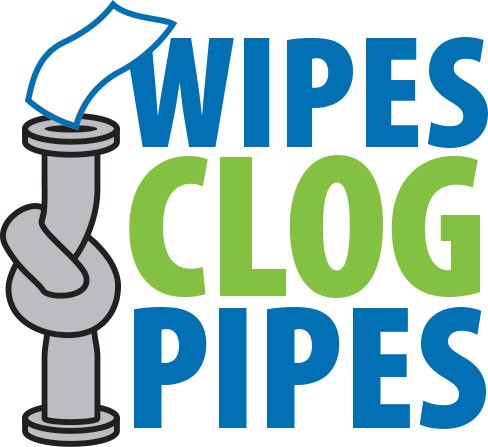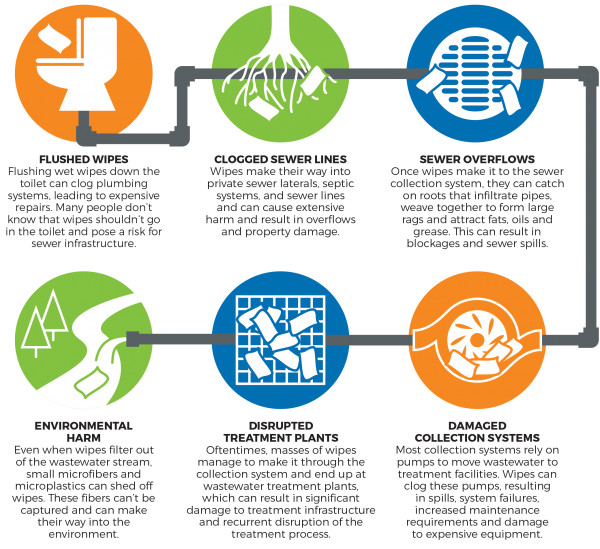
PIPES Act
On February 3, 2022, Representatives Lisa McClain (R-MI) and Alan Lowenthal (D-CA) introduced the “Protecting Infrastructure and Promoting Environmental Stewardship Act” (PIPES Act) to codify a flushability certification process for the marketing of single-use “flushable” wet wipes. The PIPES Act is complementary to the WIPPES Act (HR 4602) that requires wipes manufacturers to label synthetic wet wipes as “Do Not Flush.” Together, the two bills holistically address the problem of the flushing of single-use wet wipes. Over the past year, CASA assisted McClain and Lowenthal’s offices with the development of both the PIPES Act and WIPPES Act. See the press release for the PIPES Act and legislative text here.
Specifically, the PIPES Act would codify the International Water Services Flushability Group’s “(PAS)101: 2020 Criteria for Recognition as a Flushable Product” and require wipes manufacturers to demonstrate and certify with the U.S. Environmental Protection Agency (USEPA) that their wipes product(s) comply with the criteria to be able to market the wipes as “flushable” and/or “sewer and septic safe.” The bill also allows for USEPA to bring civil penalties upon a wipes manufacturer that fails to comply at $25,000 per day of violation and, or $500,000 for a single violation.
Please reach out to Sarah (ssap@ensresources.com) for template letters to send to your congressional delegations requesting that lawmakers support both bills.
WIPPES Act
On July 21, 2021, Representatives Alan Lowenthal (D-CA) and Lisa McClain (R-MI) introduced the bipartisan Wastewater Infrastructure Pollution Prevention and Environmental Safety (WIPPES) Act. CASA has been working with Lowenthal’s office for the past year to develop a federal wipes labeling bill.
Upon introduction, Lowenthal and McClain published a press release, in which CASA is quoted supporting the legislation, along with other stakeholder groups, including NACWA. Next steps will be for the bill to be referred to the committees of jurisdiction. Text of the bill can be accessed here.
Below is a summary of the WIPPES Act’s key provisions:
- Not later than 2 years after date of enactment, the Federal Trade Commission (FTC), in consultation with USEPA, will issue regulations to require wipes manufacturers to print clear and visible “Do Not Flush” label notices on non-flushable wet wipes product packaging.
- Prohibition on the representation or marketing of flushable attributes, performance, or efficacy benefits for non-flushable wipes products.
- FTC may bring penalty fines of not more than $2,500 for each day a manufacturer fails to comply with labeling requirements. Total fine amount may not exceed $100,000 for a single violation.
- FTC will develop guidance for manufacturers to conduct education and outreach campaigns on new labeling requirements and provide consumers with the following information:
- presence of the new label notice on product packaging
- what products have the new label notice
- intended effects of label notice on consumer behavior regarding the disposal of the products
- outreach may not promote, advocate, or depict wipes other than the wipes products defined by legislation
State Water Board News Advisory: Do Not Flush Disinfecting Wipes, Paper Towels, Down the Toilet: Click here for further information.
State Water Board reminds people not to flush disinfecting wipes and paper towels as usage increases due to COVID-19.
EPA Encourages Americans to Only Flush Toilet Paper
Nationwide Study: The Cost of Wipes on America’s Clean Water Utilities
Overview
Single-use wet wipes have gained popularity in recent years. Many of these products are marketed as flushable, but often times are not compatible with sewer systems and infrastructure. Other products are not intended to be flushed but end up being improperly disposed of in the toilet. Flushing these products presents an increasing problem for property owners, sewer systems, and ratepayers, since wipes often do not break down after being flushed. Wipes can catch on tree roots and accumulate with fats, oils and grease and become large obstructions in the pipes. Further down the line, they weave together and create giant rags which get stuck in pumps, collection systems, and motors, causing backups and equipment failures. This problem is experienced across the state, country, and worldwide as disposable wet wipe products become more widely available.

Legislation
- AB 818: Wipes Fact Sheet
- AB 1672 (Bloom, 2019); Author’s Fact Sheet
- Prior Legislation: AB 2256 (Huffman, 2010)
- Washington Wipes Labeling Legislation, H.B. 2565
- Minnesota Wipes Labeling Legislation, H.F. 3131
AB 818: Public Education and Outreach
Communications Tools
- Flushable Wipes Process
- “Wipes Clog Pipes”
- Wipes Clog Pipes Video:
ShareDrive link containing all the video files for download
Central San YouTube Link: https://youtu.be/VSP70FLhiYc
Central San Facebook Link: https://www.facebook.com/CentralSanDist/videos/423659261696457/
Webinars
CASA + CWEA: June 18, 2020, Wipes Webinar 1: Legislative and Public Outreach Efforts from 11:00am to 12:45pm
CASA + CWEA: June 25, 2020 Wipes Webinar 2: O&M and Technology Strategies from 11:00am to 12:30pm
In The News
CA Media Stories
- Oakland’s Lake Temescal Closed Again Because of Sewage Spill, Likely caused by Wipes in Clogged Drain (KTVU)
- ‘Flushable Wipes’ Bust Flush for Wastewater Treatment (Dana Point Times)
- Unexpected Coronavirus Consequence: People Clogging Sewage Systems with Disinfectant Wipes (KCLU)
- Shredded T-shirts no substitute for toilet paper; critical sewer spill averted (Redding)
- Coronavirus fallout: Toilet paper alternatives clogging toilets, sewers (SB Sun)
- Without toilet paper in stock, landlords and wastewater offices worry about what’s getting flushed (Santa Maria Sun)
- Wipes, paper towels clogging sewer lines (Press Democrat)
- Sewer systems sustaining damage due to garbage influx (Lake County News)
- Don’t flush your wipes, even ‘flushable’ ones can clog pipes, officials say (Victor Valley News)
- A lesson on flushables: Wipes, paper towels causing sewer backups (MT Democrat)
- Toilet paper shortage exacerbates plumbing problems in NorCal (KCRA)
- Toilet paper shortage could impact FPUD, Rainbow sewer systems (Village News)
- US Air Force Base: Clogging the system, please avoid flushing wipes (Beale AFB)
- Coronavirus: You’re running out of toilet paper. Now what? (Mercury News)
- What you wipe with is your business but what you flush could cause problems for everyone else (SLO New Times)
- COVID-19 Video Shows Impact of Wipes Clogging Sewer Facilities (ABC KGO TV-7)
- Because of the TP shortage, people are using wipes (SF Gate)
- Toilet paper shortage leads to sewer backup in Redding (Actions News Now)
- Toilet paper shortages caused by coronavirus blamed for spike in raw-sewage spills (SF Chronicle)
- Low on Toilet Paper? Here’s what not to flush down your toilet (CBS 8)
- Don’t Flush Those Disinfecting Wipes Down the Toilet, Water Board Begs (NBC Los Angeles)
- Disinfecting Wipes being Flushed Down Toilets Causing Major Pipe Problems (CBS SF Bay Area)
- Coronavirus cleaning – Don’t flush disinfectant wipes (LA Times)
- California Issues Warning About Disinfecting Wipes (Mercury News)
- Avoid Fatbergs, Don’t Flush Wipes Due to Virus, California Says (Bloomberg Environment)
- Flushable wipes are bad for plumbing (San Diego)
- Flushable Wipes News Coverage SASD (KRCA Sacramento)
- Disposable Hand Wipes Clog Bay Area Sewer Treatment Plants (ABC Bay Area)
- Flushable Wipes are Clogging Local Pipes (Fox News Bakersfield)
- Flushable Wipes Causing Backups in Sacramento’s Sewer System (CBS Sacramento)
- Don’t Believe Any Wipes “Flushable,” East Bay Agencies Warn (East Bay Times)
U.S. Media Stories
- A nasty pandemic problem: More flushed wipes are clogging pipes, sending sewage into homes (The Washington Post)
- Watch Now: Don’t Rush to Flush (Martinsville Bulletin)
- Pandemic Supplies Litter the Bay (Chesapeake Bay Magazine)
- Coronavirus wipes, masks a nightmare for storm drains, sewers (Apple News)
- America’s Got Talent
- Coronavirus pandemic renews interest in flushables issue
- 12 Everyday items you should never flush down your toilet (Better Homes & Garden)
- Americans coping with coronavirus are clogging toilets with wipes and T-shirts (NBC News)
- People Are Using Alternatives To Toilet Paper, And It Could End Up Clogging Sewage Pipes All Over (BuzzFeed)
- What’s Safe to Flush? Toilet tips as coronavirus spreads (The News & Observer)
- What your plumber wants you to know while you’re home during the coronavirus (Chattanooga Times Free Press)
- ‘Wipe Clogs” are causing problems in Logan City’s sewers (KSLNewsradio)
- City Officials Plead with Residents to Stop Flushing Toilet Paper Alternatives (Route Fifty)
- SJ municipalities: Don’t flush the wipes and jam up sewer systems (Cherry Hill Courier Post)
- Stop flushing your wet wipes (The Altamont Enterprise Regional)
- Flushed ‘wipes’ causing increase in clogged sewers during coronavirus outbreak (KING5)
- Georgia city warns against “flushable” wipes that are causing major clogged sewage issues (WGXA)
- Officials warn against flushing wipes, other hygiene products (St. George News)
- Wipes clogging sewage pumps (Herald-Mail Media)
- Clark County Water Reclamation District stresses importance of NOT flushing wipes (KLAS – 8 News Now)
- Disinfectant wipes and paper towels are becoming a big new coronavirus problem (The Hill)
- Experts Say Don’t Flush Anything but Toilet Paper (NBC News)
- People are Using More Wipes Because of Coronavirus, Clogging Sewers (NPR)
- So You’ve Run Out of Toilet Paper. What Else will Flush? (Popular Mechanics)
- Americans Coping with the Coronavirus are Clogging Toilets (NY Times)
- Disinfecting wipes being flushed down pipes is causing major pipe problems (CNN)
- Coronavirus causes toilet paper frenzy sewer officials give warning (USA Today)
- Why You Probably Shouldn’t Flush Flushable Wipes (D.C.)
- In Fatberg Fight, NYC Goes to War Against Flushable Wipes: The $1.1 billion market has taxpayers around the globe footing the bill (Bloomberg)
- ‘No Wipes In The Pipes’: Flushable Wipes Causing Problems In Wastewater System (Colorado)
- Washington, DC Proposes Nation’s First Wipes Regulation (D.C.)
- Wipes Clogging Up Miami-Dade Sewer System (Florida)
- West Kentucky city reminding residents what not to flush down toilet (Kentucky)
- Millions Of Dollars In Sewer Clogs Prompts Flushable-Wipes Lawsuit (Minnesota)
- Fatbergs still clogging NYC pipes to the tune of $20 million a year, DEP says (New York)
- Don’t flush the flushable wipes, township warns (Pennsylvania)
- Regulations and Testing Are Needed to Fight “Flushable” Wipes (Environmental Science & Engineering)
- Don’t Believe the Label – “Flushable Wipes” Clog Sewers (The Conversation)
- Are Wet Wipes Wrecking the World’s Sewers? (The Atlantic)
- Wet Wipes Box Says Flush. New York’s Sewer System Says Don’t (New York Times)
International Media Stories
- Surge in flushed wipes, gloves is clogging wastewater pumps, Halifax Water warns (CBC News Canada)
- Municipal Leaders Urge Residents to Think About What they Flush (Water Canada)
- The biggest headache for the pump engineer is the wet wipe (UK)
- Majority of Canadians Don’t Trust Manufacturers’ Claims About “Flushability” of Wipes (Canada)
- Campaign against ‘flushable’ wipes long overdue: City (Canada)
Links




 @CASA_CleanWater
@CASA_CleanWater